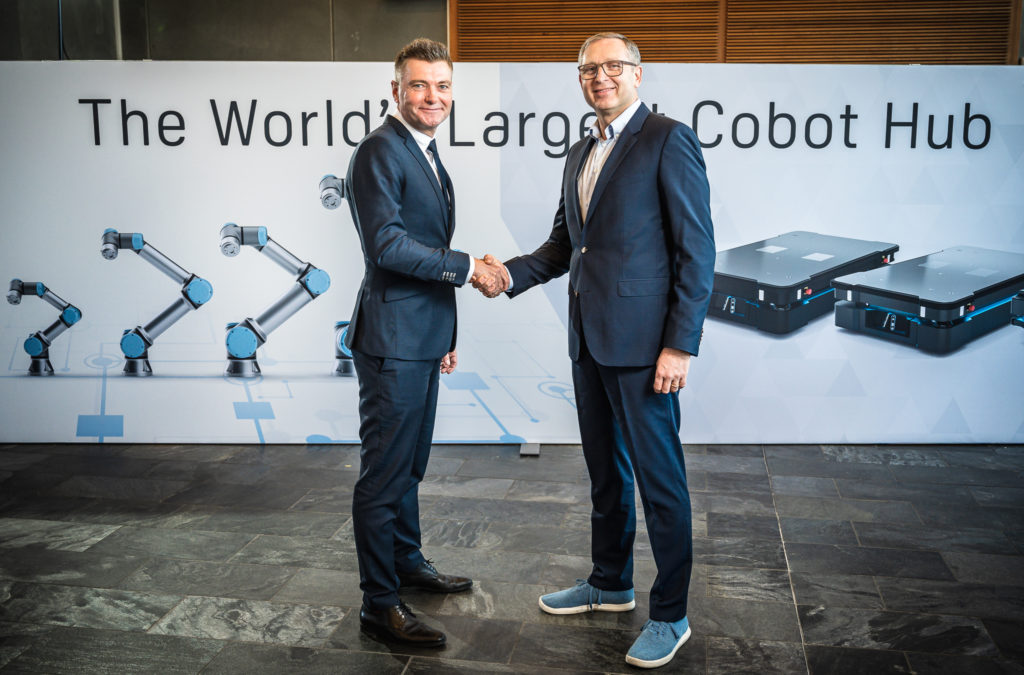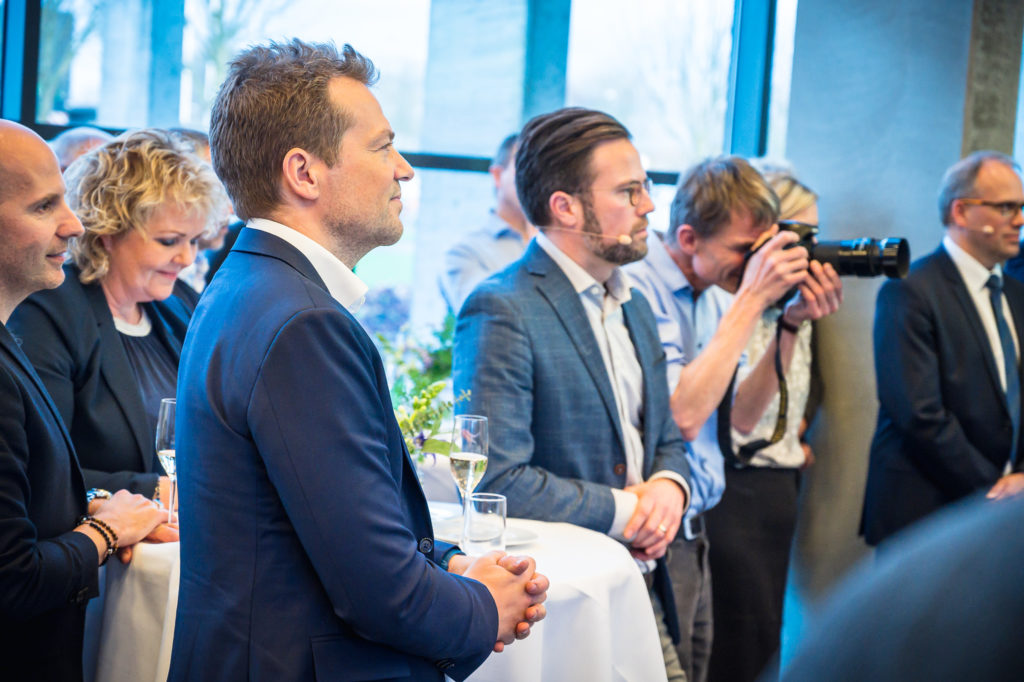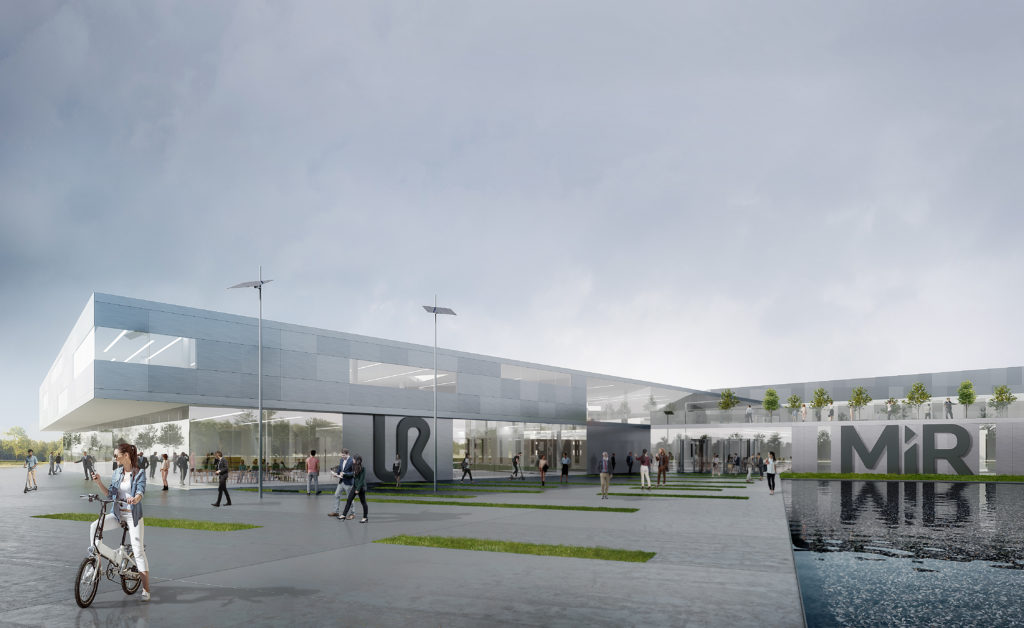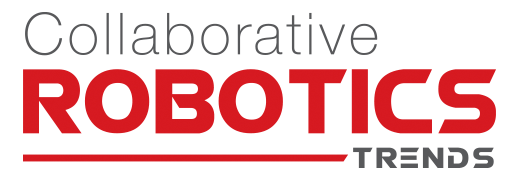
Mobile Industrial Robots (MiR) and Universal Robots (UR), along with their US-based parent company Teradyne, are investing $36 million into the construction of a “cobot hub” in Odense, Denmark. Both MiR and UR are based in Odense, which the companies call the “cobot capital of the world.”
MiR and UR are leaders in autonomous mobile robots (AMRs) and cobot arms, respectively. The two companies will remain separate entities, but a new 50,000-square-meter site will become the joint headquarters for the companies. The companies said this will create “significant synergies” to strengthen each company’s footprint in their respective markets.
MiR and UR also opened a cobot hub in Barcelona in November 2019 to promote collaborative automation in Southern Europe. A 1,500-square-meter facility in Barcelona’s 22@ district includes offices for each company, as well as a joint showroom where the latest technology and applications for AMRs and cobot arms.
“Teradyne continues to invest aggressively in the development of new products, solutions, and sales channels and this new facility is a key part of our growth strategy,” said Mark Jagiela, President and CEO of Teradyne. “We have found something very special in Denmark. The Danes’ combination of innovative industrial design, combined with a practical business sense, have created a perfect combination for this emerging industry. The ability to make robots work in collaboration with humans in a user-friendly manner is something we have not encountered to this degree anywhere else in the world and we’re very excited to expand our capabilities in Odense.”
Strength of Danish robotics cluster
“Denmark has a significant lead in the global market for cobots. Investing ambitiously in building the world’s largest cobot hub right here in Odense makes a lot of sense,” said Thomas Visti, CEO of MiR. “Offering a strong, professional environment with superb facilities enables us to attract talent from all over the world.”
MiR said it hired 100 employees within the past year, with UR adding 280 staff members during the past two years. Today, the two companies have 160 and 450 employees, respectively, based in Denmark. UR employs almost 700 employees worldwide while MiR’s staff counts a total of around 220 globally.
MiR and UR are the two most notable Danish robotics companies, but the Danish robotics cluster as a whole is quite strong. Our sister publication The Robot Report has watched the cluster closely. Danish robotics companies’ total revenue rose 18 percent in 2018, reaching $995 million with exports increasing 26 percent.

UR grew to $234 million in revenue by 2018, with nearly 40,000 cobots sold at the end of 2019. In 2018, MiR represented 9.2% of industrial automation revenue for Teradyne. For the first three quarters of 2019, it represented 14.3% of industrial revenue.
“This is a market expected to grow to a total value of almost $12 billion in 2030, according to ABI Research. Demand for Danish cobots already means that we are growing out of our current offices in Odense, both at UR and MiR,” said Jürgen von Hollen, President of Universal Robots. “Odense has a strong ecosystem of talent and we are pleased to have the opportunity to invest long-term in the unique robotics environment that we have been building here over the last 10 years.”
Teradyne’s growing automation business
Automatic test equipment for electronics still accounts for 75% of the $2.1 billion revenue Teradyne made in 2018. But that is a mature market that is unlikely to yield significant growth in the long-term future. As a result, Teradyne in the last five years has acquired four key industrial robotics startups:
- Acquired UR for $285 million in 2015
- Acquired MiR in 2018 for $272 million
- Acquired Energid in 2018 for an undisclosed fee
- Acquired AutoGuide Mobile Robots for $58 million in 2019
Automation is still a peripheral part of Teradyne’s business as far as gross revenue goes. But the company said it has invested more than $500 million into MiR and UR. In 2015, industrial automation represented 2% of all revenue, but industrial automation represented 12% of revenue in 2018. Teradyne hopes its automation unit will be posting revenues exceeding $1 billion in 2021.



Leave a Reply
You must be logged in to post a comment.